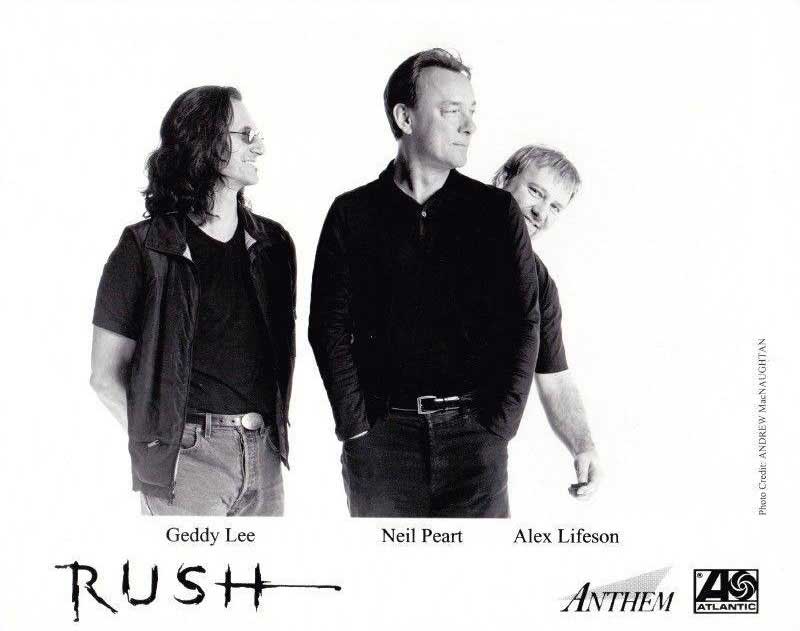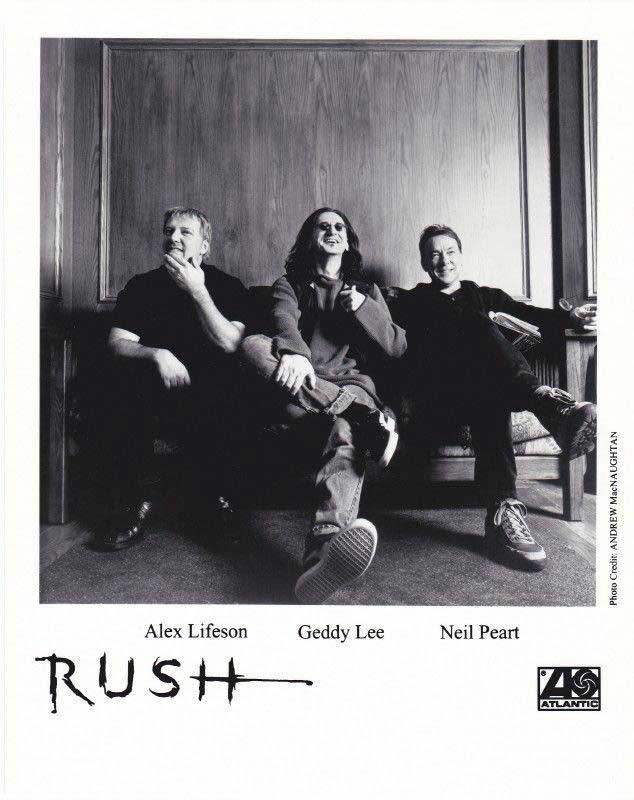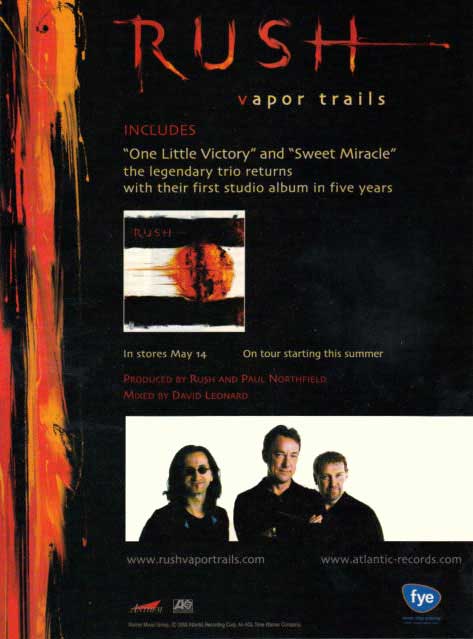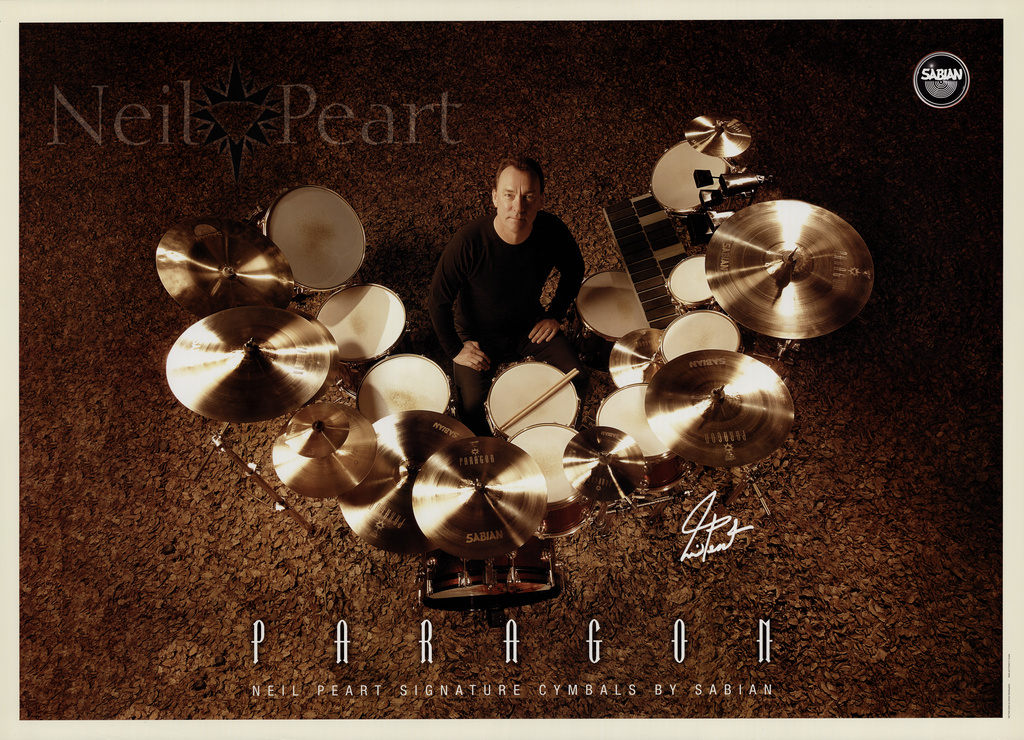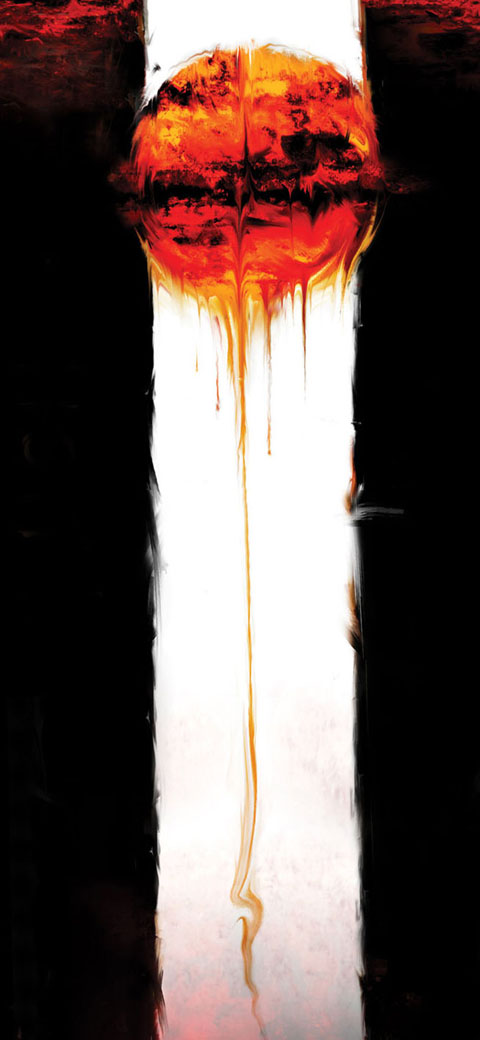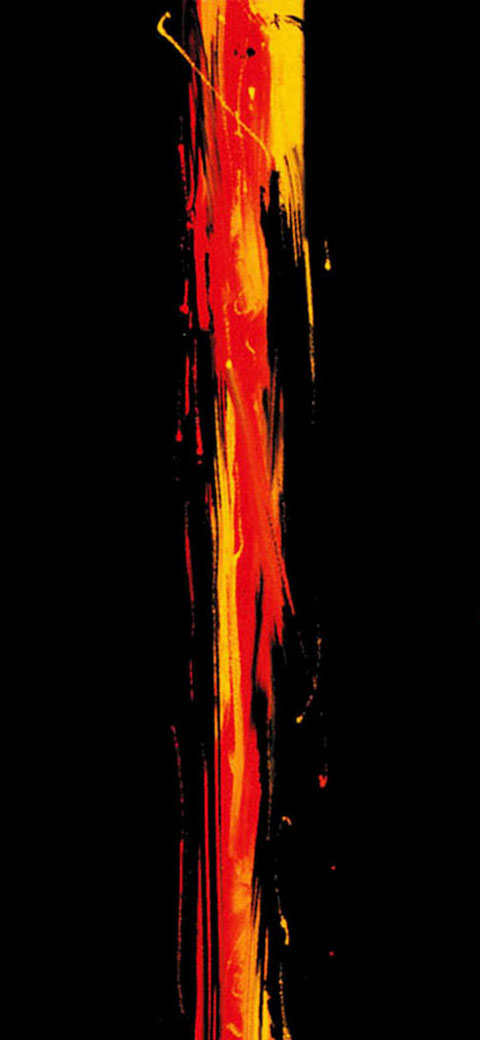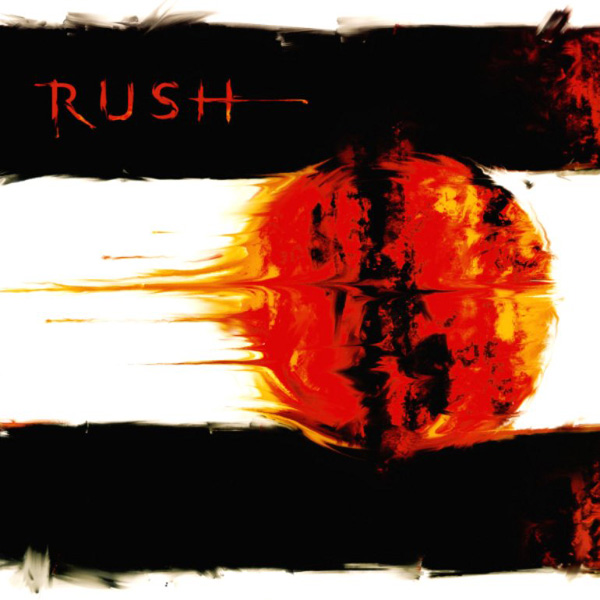
One Little Victory (5:08)
Ceiling Unlimited (5:28)
Ghost Rider (5:41)
Peaceable Kingdom (5:23)
The Stars Look Down (4:28)
How It Is (4:05)
Vapor Trail (4:57)
Secret Touch (6:34)
Earthshine (5:38)
Sweet Miracle (3:40)
Nocturne (4:49)
Freeze (Part IV of "Fear") (6:21)
Out Of The Cradle (5:03)
Vapor Trails Linernotes, Japanese Edition
By Mike Portnoy, April 2002
Rush's impact on mine and Dream Theater's lives and career is immeasurable. I think it is pretty safe to say that if it is weren't for Rush, there would be no Dream Theater !
When I met John Petrucci and John Myung at the Berklee College of Music in the Fall of 1985, there were two immediate things we found we had in common: 1. our homebase of Long Island, NY and, 2. our love (no...make that OBSESSION) with Rush.
Right from the very first rehearsal, we began jamming on all of our favorite Rush songs: The Spirit of Radio, YYZ, La Villa Strangiato. We found a common language of musical communication between us that stemmed from this music that we loved with all of our hearts, souls, minds, hands and fingers. We were three Rush fans who were so inspired by their musicality and obvious personal comradery, that we decided to devote our lives and careers to making music from a similar blueprint and background. Even the band's original name Majesty stemmed from a description one of us used to describe the ending of Rush's Bastille Day that we were listening to while sleeping out for tickets for their Power Windows tour!
Here we are 17 years later and I am both honored and priviledged to have been asked to write these liner notes for the much anticipated return of Rush with their new album Vapor Trails. Since those old days in the mid-80's at Berklee, Dream Theater has gone on to much international success and acclaim, selling millions of albums worldwide and selling out year-long tours around the world. (and all the while still getting the occasional comparison to our Canadian heros.)
But the most shocking thing to us is that there seems to be a whole new generation of progressive music fans (especially throughout Asia and Europe) that have started their journey of progressive music with bands like Dream Theater...and unlike us, haven't necessarily had the exposure to and influence from some of the pioneer bands that created this unique genre of music.
If you are one of those lucky people, I must say I ENVY you!! You have a tremendously rewarding musical journey lying ahead of you. I cannot begin to tell you how incredibly inspirational my first experience of discovering albums like 2112, Hemispheres, Permanent Waves and Moving Pictures were. The thought of some of you being able to listen to those albums for the very FIRST TIME, is something I truly do envy!
If you are already a Rush fan, then you realize how special today is: you are holding in your hands THE BRAND NEW Rush CD!!! An occasion such as this used to be a national holiday in the Portnoy, Petrucci and Myung homes. And this is a CD that many Rush fans feared would never be made. Although I cannot say I ever doubted their return, it does happen to come off of a five year hiatus which is the longest in the band's career. And it is obvious that they have come back with a vengeance. All of the classic Rush qualities are intact: Geddy's totally unique voice and virtuosic bass playing, Alex's chordal guitar textures and wall of sound, and Neil's legendary drumming and breathtakingly poetic lyrics. But there is also an obvious new sense of exploration. The playing is fresh and vibrant. The songs are immediate yet constantly venturing into new territories. The production is tight enough to be crisp and balanced yet loose enough to feel their new surge of life.
Here they are ladies and gentlmen, the unveiling of Rush in the New Millenimum....
Listen, learn, enjoy....
I know I will be!
GEDDY LEE
bass guitar, vocals
ALEX LIFESON
electric and acoustic guitars, mandola
NEIL PEART
drums and cymbals
Music by Lee and Lifeson, Lyrics by Peart
Produced by Rush and Paul Northfield
Recorded by Paul Northfield, Geddy Lee, and Alex Lifeson, at Reaction Studios, Toronto, January - November, 2001, assisted by Chris Stringer
Mixed by David Leonard at Metalworks, Mississauga, December 01 - February 02, assisted by Joel Kazmi
Mastered by Howie Weinberg at Masterdisk, NYC
Additional mastering and sequencing by Roger Lian at Masterdisk, NYC
Management by Ray Danniels, SRO Management, Toronto
Executive Production by Anthem Entertainment: Liam Birt and Pegi Cecconi
Equipment care and feeding by Lorne (Gump) Wheaton
Art Direction, paintings, and portraits by Hugh Syme
Thanks to everyone at Reaction Studios: Ormond, Claire, Chris, and Jeff, and everyone at SRO: Ray Danniels, Pegi Cecconi, Sheila Posner, Anna LeCoche, Cynthia Barry, Shelley Nott, Steve Hoffman, Bob Farmer, Randy and Frances Rolfe.
As always, we owe our families a huge debt of love, gratitude, appreciation, and attention. We also owe them an apology.
For technical help and contributions, our thanks to Jim Burgess and Ed Wilson at Saved By Technology, Andrew MacNaughtan, Barry and b. zee brokerage, Paul Reed Smith, Fender bass guitars, Coll Audio, Tyme Rogers at Tech 21, Mackie Digital Systems, Steve and Mark at Hughes and Kettner amplification, Dean Markley, Sean Browne at Yamaha, Drum Workshop, Avedis Zildjian, Promark, Remo, Roland electronic percussion, and - Ω™
Brought to you by the letter "3"
© 2002 Atlantic Records © 2002 Anthem Entertainment
Notes
- Atlantic/Anthem, May 14, 2002
- Highest Billboard Chart Position: 6
- Vapor Trails was released in North America on May 14, 2002, with release elsewhere shortly before or after that date. After the first week, the album climbed to #6 on Billboard's Chart with sales of 111,199, while Soundscan reported it as #3 of the Top 100 albums in sales and #1 among the Top 50 Metal Albums. Sales of the album drop severely the second week, with 41,000 copies sold (#25 overall), prompting a typical Rolling Stone response "Typical of a cult band whose diehards purchased Vapor Trails in droves the first week...Sales down a WHOPPING 63% from the first week". Vapor Trails Billboard Top 100 Ranking History: Week 1: #6; Week 2: 29; Week 3: #43; Week 4: #66; Week 5: #77. In Germany, the album enters the Charts the first week at #20; Week 2: #57; Week 3: #65; Week 4: #85.
- "One Little Victory", the first single, was released March 29, 2002, debuting at #22 on Billboard's Mainstream Rock Tracks chart.
- "Secret Touch", the second single containing both the album version and a radio edit, was released to radio stations June 10, 2002, and reached #26 in Mainstream Rock Airplay after one week ("One Little Victory" still held #9).
- "Sweet Miracle", the third and final single, was released September 23, 2002.
- The Japanese release includes a linernotes essay written by Dream Theater's Mike Portnoy.
- Both the album version and an instrumental edit of "One Little Victory" were included in the in-game soundtrack of Need for Speed - Hot Pursuit 2 , released July 9, 2002.
- Vapor Trails Remixed was released September 30, 2013; click here for the history of the Vapor Trails remaster/Vapor Trails Remixed.
- Click here for the 'Vapor Trails' Transcript Archive.
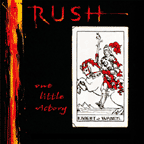
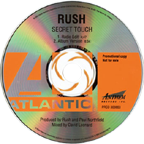
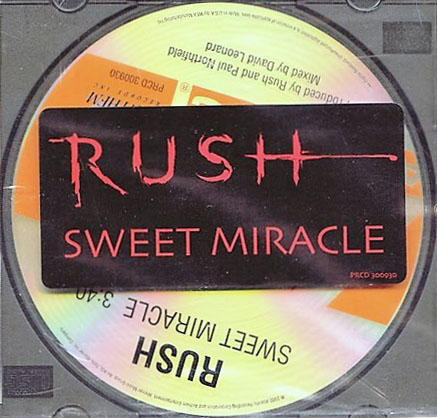
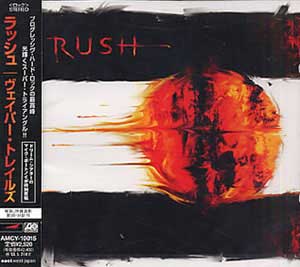
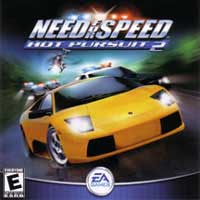
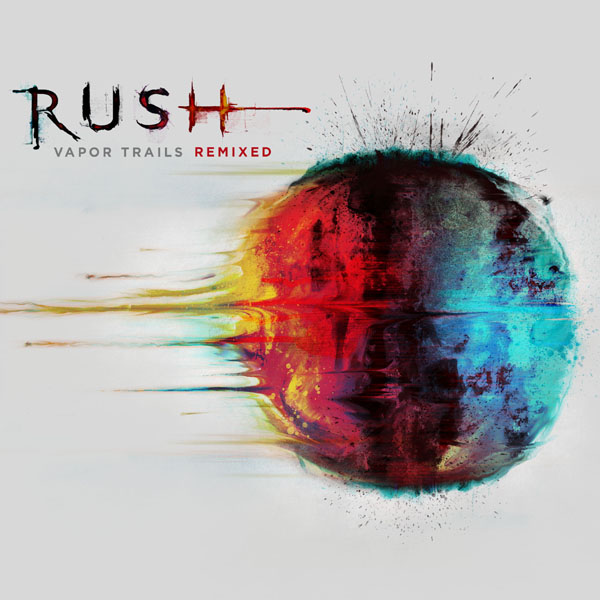
In Their Own Words
"Peart tied the knot with photographer Carrie Nuttall in a small private ceremony Sept. 9 in Montecito, California, near Santa Barbara. The couple is planning a larger reception for October 8, also in Southern California, the bride's home region. Peart has been on a long hiatus from Rush since the death of his daughter in a car accident in 1997 and the loss of his wife to cancer less than a year later. The drummer is now expected to re-join bandmates Geddy Lee and Alex Lifeson in a Toronto studio early in 2001..." - CDNOW, September 20, 2000.
"Rush is not heading into the studio just yet. we have plans to regroup for writing purposes in January. Hopefully, those sessions will lead to an album being finished sometime late next year or early 2002." - Barnes & Noble Chat, November 13, 2000.
"It is about us coming back together. It is about the psychological health and welfare of all the people who have gone through a very difficult time ... I want it to happen, and I want it to happen in a very positive and natural way." Geddy Lee, Jam! Showbiz, January 12, 2001
"...it is January 2002. For a year I have been back working with Geddy and Alex in a small recording studio in Toronto, composing, arranging, and recording a new Rush album called Vapor Trails. The title grew out of a metaphor which first appeared in a letter to Hugh Syme, in the summer of 1999, as an off-handed reference to the ghosts of memory. The song 'Vapor Trail' was also one of the first lyrics I wrote for the project, for the first few songs I worked on necessarily had some philosophical and emotional 'baggage' to sort through. Songs like 'Sweet Miracle' and 'Earthshine' reflected the joy of my new life, and then I moved on to less personal, more conceptual themes." - Neil Peart, Ghost Rider
"When I did come back and play, it was when I was at the very lowest point. I was so desperate. It was like, What can I do now? But the answer came to me: I'll play the drums." - Neil Peart, Modern Drummer , September 2002
"Although things began rather slowly, as you can well imagine after 6 years between writing sessions, and considering all that we and Neil in particular have been through personally, I'm happy to report that we are now deeply ensconced in the creative mode and a collection of songs is starting to take shape. More importantly there is an optimistic atmosphere and we are once again communicating fresh ideas together as a band. Experimenting as always, but not afraid to get a little physical!! ... And so we will continue on with this process until such time that we all feel confident that the material we have written is "great" enough to be released as the next Rush album. When that will be? I can't say exactly, but with luck on our side we hope to release something early in 2002." - Geddy Lee, www.geddylee.net, May 30, 2001
"A lot of the songs were just jams, where Geddy and Alex got together in front of a recorder, set up a groove on a rhythm machine, and started playing. And then later, Geddy would go back and sift through those jams and say, 'This eight bars is good,' 'This four bars is good,' or, 'If we took that two bars and repeated it, that would be good.' So they stitched together these things into a structure. At the same time, I was feeding Geddy lyrics so he could sing over the ideas they were coming up with. And then we did what we call 'leap-frogging,' where we individually work on the songs ourselves-the drum parts, guitar parts, and vocal/bass parts-without holding up each other and without getting caught up in too much editorial commentary from each other. We start off with that rough tape Geddy will have created, and then Alex will add guitar parts more to the vision he has for the song. Then I'll take that tape and come up with drum parts that I think will work. Then Geddy will respond to my drum parts and say,'Well, the bass part would be better if it went like this.' Then I'll hear that and it'll give me ideas. So we're constantly improvising and developing the ideas, even though we're never really playing the song together." - Neil Peart, Modern Drummer , September 2002
"Rush has returned to the studio. The rock legends are bunkered down in a Toronto studio, recording the long-awaited follow-up to 1996's Test For Echo. Rush began recording their new album in earnest with producer Paul Northfield in mid-August after spending much of the year in pre-production mode writing and arranging songs and recording home demos. Northfield previously engineering such Rush classics as Signals, Exit Stage Left, Moving Pictures and Permanent Waves and co-produced the last Rush release, Different Stages, a triple-disc live effort released in 1998. The Canadian has also produced I Mother Earth, Moist and Honeymoon Suite and engineered and/or mixed albums for Hole, Marilyn Manson and Ozzy Osbourne." - Vancouver Province, September 16, 2001
"Rush has completed recording tracks for their highly anticipated new album. The legendary power trio - Geddy Lee, Alex Lifeson, and Neal [mispelled by Atlantic Records ] Peart - recently wrapped up recording sessions in Toronto, and are now in the midst of mixing. The album - which is being produced by Rush with engineer Paul Northfield (Marilyn Manson, Hole) - is the Canadian band's 17th studio recording, and their first all-new collection in over 5 years. The as-yet-untitled set is currently slated for an early spring release." - Atlantic/Anthem, January 9, 2002
"Not wanting to 'rush' into anything - legendary arena-rockers, Rush, have just put the finishing touches on VAPOR TRAILS , their 17th studio recording. VAPOR TRAILS marks the band's first all-new album since '96, and comes as the follow up to their recent RIAA gold-certified TEST FOR ECHO . The renowned Canadian power trio - Geddy Lee, Alex Lifeson, and Neal [again mispelled by Atlantic Records! ] Peart - recorded the album in Toronto, recruiting engineer Paul Northfield (Marilyn Manson, Hole) to assist in production duties. The massively anticipated album is slated to hit stores in May. Rush - among the world's most popular rock bands for more than a quarter century - have seen 22 of their albums score RIAA certification of gold-or-better, with cumulative worldwide sales of over 35 million." - Atlantic-Records.com, March 13, 2002
"Anthem/Universal Music Canada Recording Group Rush has announced details of their eagerly awaited new album, VAPOR TRAILS. The 13-track collection, produced by Rush with engineer Paul Northfield (Marilyn Manson, Hole), is set for release on May 14, 2002 VAPOR TRAILS sees the legendary power trio - Geddy Lee, Alex Lifeson, and Neil Peart - redefining their intensely individualistic music, blending their famously complex dynamics with driving melodic hooks and a passionate, personal lyrical approach. Tracks like the kinetic "How It Is," the emotive "Sweet Miracle," and the propulsive album-opening "One Little Victory" are angular, atmospheric and altogether extraordinary. With the visionary new VAPOR TRAILS, Rush has taken a bold step forward, making it clear that one of rock 'n' roll's all-time great bands are more than just back, they're better than ever. The album will be heralded by the single, "One Little Victory," slated to ship to rock radio outlets nationwide on March 29. The band is currently finalizing plans for a major North American tour. Tentatively set to kick off in late June, the trek will mark Rush's first live performances since July 1997. The tour's first leg will be announced shortly. VAPOR TRAILS is Rush's 17th studio recording, and their first all-new collection in over 5 years. The Canadian trio's 22 albums have virtually all been certified CRIA platinum-or-better, with cumulative worldwide sales of over 35 million. The band were inducted into the Juno Awards Hall of Fame in 1994, received the esteemed Order of Canada in 1997 and were given their own star on the Canadian Walk of Fame in 1999." Press Release, geddylee.net, March 15, 2002
"We liked the visual idea of how fleeing a vapor trail is, its there one minute, gone the next. A lot of what's happened in the last five years has brought us around to that way of thinking, and how important it is to cherish every moment we have. And Neil has gone through quite a tragedy, and we all took a very slow recovery from that. And we got down to making this record, it just summed up our feeling of how fleeting life can be." - Alex Lifeson, KLBJ interview, April 10, 2002
"This was an exceedingly difficult record to make. We spent about 14 months on it, and we've never spent that amount of time on a record before." - Geddy Lee, KGON interview, April 10, 2002
"We spent 14 months working so hard on this record. We spent a lot of money making this record. We spent a lot of money on the packaging, making it the best record we could. A lot of time and energy went into it. To have it on the Internet and download a crappy file is heartbreaking for us. Unfortunately, that is the way it is now. True Rush fans will go get the record, because they want to have that connection, and the lyrics." - Alex Lifeson [his reaction to Vapor Trails being leaked to the internet on April 10th, over a month before the official release], Jam! Showbiz, May 5, 2002
"As I looked over the map I noticed that Fernie, British Columbia, where my friend and fellow Rushian Alex was born, was just to the west. Wouldn't it be fun to send him a postcard from there?...A few minutes later I was sitting on my motorcycle, parked on its centerstand, writing a postcard to Alex. Concerned only that the name "Fernie" appear appear on the card, I hadn't really paid attention to the picture, but before I started writing I noticed the caption at the top: "Ghost Rider." Turning it over , I saw a photograph of a lenticular cloud trailing off the peak of Trinity Mountain. Ghost Rider was apparently the local name for this atmospheric phenomenon. Now, it must be explained that Alex and I shared a particular mode of writing to each other in "Moronese," and with the pen in my left (wrong) hand I started scrawling, "Eye em thuh gost rydur." Then I stopped, my head jerked back, and I thought, "Whoa, yeah! - I am the ghost rider!" The phantoms I carried with me, the way the world and other people's lives seemed insubstantial and unreal, and the way I myself felt alienated, disintegrated, and unengaged with life around me. "Oh yes," I thought, "that's me all right, I am the ghost rider." - Neil Peart, Ghost Rider: Travels on the Healing Road, pp 103-104
"Everything was already written by [September 11, 2001]. The last song that needed to be finished was 'Peaceable Kingdom.' It was already written and slated to be an instrumental song. Paul (co-producer Northfield) said 'You guys are nuts if you make this an instrumental song. You should really come up with some good lyrics for this'. Neil gave it some thought, and what happened on September 11, that was really a direct result of that. I think he wrote the lyrics the following week. I'm glad it wasn't an instrumental. It is my favourite song on the record. It has such a weird character to it. Lyrically I think it is great. The chorus, ('a wave toward the clearing sky ...'), it is so powerful and visual. It is such a great contrast from the heaviness of the rest of the song." - Alex Lifeson, Jam! Showbiz, May 5, 2002
"Earthshine was the first song that we wrote. At the time we both felt that we weren't going to be too precious about it, it was part of that early period that we went through with the writing, about 5 months into the project I guess? Six months? We reviewed the song and decided to completely rewrite it. There were some lyrical changes, but 100% of the music was thrown into the garbage, and we started over again with it. Which was really a testament to working this way without a deadline, and how important it was not to have a deadline with this record." - Alex Lifeson, "Rockline", May 13, 2002
"Yeah, [Earthshine] was just not right in its original incarnation. The lyrics were very interesting, and very evocative, but I didn't feel in the end-and Alex agreed-that the music really equaled what was there lyrically. We were selling the lyrics short. So we had this jam music that we really were excited about, especially this riff, this main riff, that is the verses for Earthshine, and I rebuilt the song vocally aroung that riff. Then we proceed to just carry on with it, and before we knew it we had a whole knew song that was really exciting." - Geddy Lee, "Rockline", May 13, 2002
"I think [Sweet Miracle] was the second song we wrote for this album. This came from the very earliest parts of the writing sessions, and it just happended. The lyrics I felt were very moving, and the melody just came out of me." - Geddy Lee, "Rockline", May 13, 2002
"It's funny, we didn't realize we were doing [another part of "Fear"] until Neil put together the list at the end of the record and tagged on that it was part four...It was a song that dealt with fear but the connection with the other three songs was an afterthought. Those original three songs dealt with fear and how it takes hold of your life. And this does as well. It's a different take on it so it's quite appropriate that it's part of that group." - Geddy Lee, Aquarian Weekly , May 15, 2002
"[Nocturne] was one of the later songs that we wrote for the record after the break that we had. There was a group of about 5 or 6 songs that came from a two week period of just what I would consider the best jams Alex and I have ever had. I really love this song, I love the drum pattern, especially the way it starts. Its kind of about the questions you can subconsciously answer in your dreams without realizing it." - Geddy Lee, "Rockline", May 13, 2002
"There's somehting about the energy of this record, and the passion of it that reminds me of two other records. One is 2112 . Obviously the music is quite, quite different, but the intensity is reminiscient to me of that record. And also Permanent Waves . There's an optimism that exists on Permanent Waves , and a freshness, a liveliness of playing that has a lot in common with this record." - Geddy Lee, "Rockline", May 15, 2002
"[One Little Victory] was kind of a triumphant song for us, in the lyrics and the message that the song is about. There was something about that song that seemed just so darned approprate for opening the record, and also being the first release for us in such a long time. That song started as a collection of jams that Alex had done late at night, just a collection of guitar riffs all linked together in a really kind of a typically-Alex-nonsensical way. I came in the next day after he'd done these things, and just kind of scratched my head but really liked a lot of it. At the same time, there were some lyrics there that Neil had written, which were one of the few lyrics that immediately I just loved, I didn't want to touch a word, it was all great. And so I played with it for a couple of days, started using the digital equipment to manipulate the riffs and add my bass to it, and start writing some vocal melodies. And before I know it I had a song, or what seemed like a song. And then I ran it by Mr. Lerxst here, and he seemed to really dig it. So that kind of became a song and it didn't change much after that." - Geddy Lee, "Rockline", May 13, 2002
"'One Little Victory.' I'd been working on that tune and came up with that double bass part. I thought it worked perfectly for the end of the song. But Geddy said, 'That's a great part. You ought to open the song with it. That would just kill.' Frankly, I wouldn't have done it that way-I don't think I would have been so assertive-but Geddy suggested it and I said, 'Okay, I'll try it.'" - Neil Peart, Modern Drummer , September 2002
"I think 'Secret Touch' is my favorite song on the record, and I love playing it live. It's got a great intensity about it." - Geddy Lee, Contents Under Pressure
"We wanted the record to be a little more organic, a little more representive of us as a three piece, and more direct. I think we've been working towards this for awhile now. The last few records we've been using the keyboards less and less. They were becoming quite secondary and background instruments. But we took it upon ourselves to create other sounds with the guitar, I tried to do more textural things, and Ged used his voice a lot to create the same sort of things that keyboards would have done in the past. I think it was a lot more satisfying, it was really a nice creative way to make some sounds and tonal shadings that were more dimensional and more organic." - Alex Lifeson, "Rockline", May 13, 2002
"I didn't feel like doing [guitar solos]. I got a little bit of pressure from Geddy, he thought that I should probably do more than I chose to do. But it seemed to me to be more interesting to do instrumental passages that we all kind of soloed at the same time. I didn't want there to be a focus on a guitar solo in a song that had this kind of emotional content that a lot of these songs had, it just didn't seem right to me." - Alex Lifeson, "Rockline", May 13, 2002
"In a way [not having guitar solos] gave us an opportunity to stretch out and jam as a band, and a lot of the middle section of our songs are quite complex and go through lots of different changes on this record. So we're all kind of soloing together in a way, and I think it created a kind of modern and unique approach to the middle sections of songs. It also gave me an opportunity to layer some vocals in some very unusual ways in the middle of some of these songs." - Geddy Lee, "Rockline", May 13, 2002
"For me, [the cover] represents the burning fire of life. It is a beautiful painting, and off of [the ball of fire] comes sparks and trails and whispers... Those are very symbolic to me, they represent memory, spirit, all sorts of things that are connected to life...." - Geddy Lee, "...And the things that we leave behind." - Alex Lifeson, "Rockline", May 15, 2002
"Initially the idea was to build on the concept of vapour trails and everything from the serious to the seriously silly was explored, not least the idea of a dragon. That was quikly rejected: 'It kind of tipped the scale way too much into the era of rock music that is 'Wakemanesque', that grand and terribly British folklore kind of thing,' says Hugh. Instead, Neil agreed with Hugh that a comet would work, so the cover artist set about putting together a conceptual piece, in oil on canvas. 'It was a real quick and dirty rendering,' says Hugh, but when Neil and the others saw it, they loved the image. 'What was a study became the original for the cover!'" - Chemistry
December 2002: Rush is listed in FMQB's 2002 Year End Charts, a ranking of the top 100 singles based on total number of spins in their respective radio formats for the entire year, as follows: in the Mainstream Rock category, "One Little Victory" ranked 13th with 14,291 spins while "Secret Touch" ranked 55th with 3,860 spins; in the Active Rock category, "One Little Victory" ranked 60th with 5,268 spins.
Although listed as the #19 top grossing tour of 2002 by Pollstar Online, Rolling Stone magazine reported Rush came in at #21 in tours from 2002, stating the tour net $13.4 million. "Rush released their first new album in six years, Vapor Trails, and followed it up with a tour that brought the Canadian power trio an $18 million guarantee. The band's devoted following helped the outing gross $27 million in sixty-two cities. But that's a lot of moving around -- compare it to Billy Joel and Elton John's tour, which grossed $65 million for thirty-four shows in fourteen cities -- so a good chunk of that got eaten up on the road." - RollingStone, April 3, 2003
"The first version of 'Earthshine' sounds nothing like the one on the ['Vapor Trails'] album. We threw all the music away; we thought the lyrics were great and it was the first thing we wrote musically and we liked it for a week and then the doubts crept in. There are usually one or two songs that you're struggling with tooth and nail. 'Tom Sawyer' was one of those songs, and right up until the end it was a struggle. Everything we did on that song was just like pulling teeth. Alex went through a hundred different sounds for the guitar solo. There's always one song that haunts you and drives you crazy." - Geddy Lee, Classic Rock , October 2004
"In the glimmer along the peaks, I saw a dusting of white around the highest summit, Telescope Peak, where I hoped to hike the following day. Telescope Peak was an important place in Ghost Rider, and in my life, really. In October 1999, when I had been rambling aimlessly around the West for the better part of a year, trying to find some way to face the world again, I hiked to that 11,049-foot summit. The next day, I rode on to Los Angeles, where I met Carrie, and my whole life changed completely (and needless to say, positively). An irresistible metaphor seemed to arise there-that I had climbed to the highest point in Death Valley from the lowest, then descended to travel onward and find Life again. In the book Ghost Rider I had used Telescope Peak as an important symbol, and had written some lyrics called 'Telescope Peak,' too, around the refrain of 'the last lonely day.' Those lyrics hadn't found a musical home with my collaborators, Alex and Geddy, during the songwriting sessions for our Vapor Trails album in 2001, but fair enough-those guys shared enough of my grief, in life and in art. In any case, the best lines from 'Telescope Peak' were recycled into other songs, like 'Ghost Rider' and 'How It Is,' so nothing was lost...Early next morning I rode about sixty miles across the valley and up Iigrant Canyon Road, aiming for a hike in the Panamint Mountains. I was still thinking of going for the 'big one,' Telescope Peak, as I wanted to close that circle of more than nine years ago-revisit the place that had also inspired another line in 'Telescope Peak' that ended up in 'Ghost Rider:' 'From the lowest low to the highest high .'" - Neil Peart, News Weather & Sports, December 2008
Vapor Trails Remaster/Remix History
May 14, 2002: Vapor Trails is released.
"'Geddy went away to do the mastering. I went away on a golfing trip as soon as we finished (last February),' Lifeson says. 'It had been 14 months (making the record), and in the past, we spent four to six months making a record ... I just had to go. I felt badly, because everything was dumped on Geddy, to do the mastering and make all those decisions.' Even as he was hitting the links, Lifeson was on the phone four or five times a day with Lee, who was forced to deal with unexpected glitches that didn't emerge until late in the recording process. 'We found problems that we didn't hear in mixing that were apparent in mastering. To get the kind of levels (we wanted), we had digital distortion. We remixed a couple of songs half-way through the mastering, through the remix, back to mastering,' says Lifeson. 'The poor guy (Lee) was doing this on his own. It really shook him up...He said: 'I don't know what to think. I think it's awful.'" - Jam Showbiz, Lifeson on the making of Rush's 'Vapor Trails', May 7, 2002
"I now have a 2001 Audi A6 4.2...It has their upgraded Bose system. It's a great system. I'm in that car listening all the time, listening to mixes. I base all of my decisions on what I hear in that car." - Alex Lifeson, RoadGearMag.com, May 2002
August 2002: The first rumblings of the mastering problems and being a victim of the "loudness wars".
"This is easily my favorite collection of Rush songs in years, maybe decades. It's incredible work and I earnestly hope it reflects a new and sustainable direction for this great band. However there was one fact that the reviewers had all left out: this CD sounds like dogshit. Perhaps you think I'm being a little strong. I think not. This is without prefix or suffix the worst sounding Rush CD ever made. In fact it is so bad that I cannot listen to more than a few songs before I just have to turn it off. What's the cause of this sonic catastrophe? There's no secret here: loudness. Vapor Trails is just the latest CD to fall victim to the current craze of LOUDER IS BETTER production. Rush is not alone. Most of the current crop of rock CDs have been punished by the LOUDER IS BETTER process..." - Rip Rowan, "Over The Limit", ProRec.com, August 31, 2002
July 2004: Atlantic announces it will reissue the first five Atlantic era Rush studio albums (Presto through Vapor Trails ).
August 31, 2004: Without explanation Vapor Trails is not included among the Atlantic reissues.
March 2005: Atlantic adds a preorder link for the Vapor Trails remaster on its website, and an anonymous source close to the band confirms to Power Windows that "its release is imminent".
May 16, 2005: Atlantic Records once again delays the release of the Vapor Trails Remaster . An anonymous source close to the band confirms to Power Windows that the album has been remastered, but that Atlantic decided to delay releasing the remaster as there are apparently plenty of the original still in stock. Those who preordered the remaster from the Atlantic website received the following email:
January 2006: The first admission from the Rush camp that there is a problem with the mastering:
"I didn't hear it until it was all said and done, at which point the record company was over the moon with it, saying it was fantastic, let's get it out there...To me it's guilty as charged. All you can say is decisions were made at the time, everybody was just really tired and we did what we felt was right, and then given a month or two's hindsight we found it was wrong." - Paul Northfield (Producer of Vapor Trails ), Chemistry (published January 2006)
April 2007: The first comment from a band member that they are displeased with the sound of Vapor Trails :
"For me it's really a sonic issue: it was mastered much too hot; it's too loud and it eats away at us and we want to address that - and maybe for no other reason than it would just make us sleep peacefully at night." - Alex Lifeson, Metal Edge Magazine, April 2007
December 2008: "One Little Victory" and "Earthshine" are remixed for Retrospective III ; Alex Lifeson first discusses the possibility of a complete Vapor Trails "remix" as opposed to a simple "remaster" (i.e. going back to the original master tapes):
"You know, Rich Chycki just remixed a couple of the songs for the retrospective that's coming out, and he did such a great job that we're so tempted to just remix that album, because we've never been pleased with the mix, and particularly the mastering on it. It's a dangerous precedent that you set by doing that, because you want to go back and re-do a bunch of things. We were never happy with that one. There are a lot of reasons for that. We're to blame for a lot of that. The way we recorded it was very impulsive. We didn't spend a lot of time on getting sounds, and we used a lot of the stuff that we did in the writing phase, rather than re-recording things. So, to maintain the pure energy of what those ideas were, we gave up a bit on the sonic end. But, Rich just has this way of mixing and hearing this band that translates so well into our heads. He did a great job. He remixed 'One Little Victory,' and 'Earthshine'. They sound so big and powerful and heavy and thick and round. Whereas, the original recordings are very compressed, and a little bright and scratchy. So, we listened to those and we thought 'well, look, what is the point in remixing it really? We would just be doing it for ourselves...and...so...well, ok why not - let's do it!' So, we're sort of toying with the idea, when we have some spare time, of just remixing that whole album, just for our own peace of mind...That record was a very emotional record for us, and it was very fragile. From the heavy stuff to the more melodic stuff, it was a very fragile representation of the band, in the way it was recorded. In mastering, unfortunately, it was a contest, and it was mastered too high, and it crackles, and it spits, and it just crushes everything. All the dynamics get lost, especially anything that had an acoustic guitar in it. Anyways, it's something that we're thinking about. We're kind of busy right now, we have our hands full. But it's certainly something that, once we have some spare time, we could get Rich working on. He and I are doing a lot of stuff together these days." - Alex Lifeson, Modern Guitars, December 2008
February 2011: A complete Vapor Trails remix reissue is announced, but no release date given :
"Rush are planning to totally remix their 2002 album Vapor Trails...guitarist Alex Lifeson revealed: 'We were never happy with the production. Perhaps we should have taken more time over the record. But now we've got the chance to improve things. There will be no re-recording, just a remix'." - ClassicRock.com, February 3, 2011
"A while back, I re-mixed One Little Victory and Earthshine from Rush's 2002 release Vapor Trails to be included on their 2009 release Retrospective 3 . The re-mixes were very well-received so the band has decided to let me move ahead and re-mix the remainder of the CD. To put rumors to rest, there was no re-recording or performance correction done on the first two tracks and that will continue for the remainder of the CD. The reason 'new' details may seem to have appeared in those songs is due to the fact that I listened to the multitracks and interpreted the mix structure without first analyzing the original [deliberately] - so tracks either muted or turned down in the original mixes may shine through differently (the acoustic guitars in Earthshine might be a good example of this). As well, the same technical tweaks will continue for the remaining songs and I still will not have a buss limiter on the mix set to stun. In any case, both the band and I are really excited to re-visit Vapor Trails and hope you'll all enjoy the re-mix." - Rhichard Chycki, richardchycki.com, February 4, 2011
February 2011: Alex discusses the remix at length with Gibson.com:
"Well, we've been toying with that idea for quite a few years now. And there was initially no interest from the record company in rereleasing it. It's a little bit of a dance that we would have needed to do without their support in terms of releasing it and getting the releases for it. The thing about that, I mean, you walk a very narrow line... That album's almost ten years old. It's a very, very important record for us. There's a lot of emotion on that. We were coming back after a very difficult period in the band's history and certainly in Neil's life. So for us, there's a great deal invested in that record and it's very, very special. And in a lot of ways, I wouldn't want to change anything, because it was recorded in such a way that we captured the very essence of what we were doing at that time. You know, you could say that that album is sixty percent demos, because really that's kind of what it was. Most of that record was what we wrote. We didn't rerecord it. It was the most basic essence of the idea. And that's what was really special. But sometimes when you do that, you're not really aware or conscious of production merits, sounds, spending time creating sounds and, you know, developing that end of it. So consequently, the record suffered a little bit from production or lack of production. And when it went to mastering, it was mastered very hot and all we hear is the little bits of distortion here and there, and these compromises that were made on production. It's always bothered us, so we thought [we would consider it after hearing] a couple of songs that Rich Chycki remixed. They were really a lot closer to the way we always would have liked to have heard that record, you know? And we talked about it and so we decided, 'Let's just - you know what, if it's just for the three of us - let's just remix the record so we're happy with it. At least we know that we've done it, that we've got that out of our system. We'll pay for it. It's no big deal. Let's just do it.' You could say that of any record. Go back and remix Caress of Steel or something, but I don't know. Something about Vapor Trails... We just don't feel like we serviced the record properly and we want to give it another breath. And I know it upsets a lot of fans. It goes both ways: I hear from a lot of fans who think it's just a great a idea and they can't wait to hear it, and others who say, 'Why are you touching this record? You should not touch this record.'" - Alex Lifeson, Gibson.com, February 18, 2011
May 2012: Ten years after the original release, it is again discussed with no release in sight:
"We've been talking about [the Vapor Trails remix] for years but every time we try to make a move on it something else comes up and because it's a back burner issue it gets left. We were very close a while back and Rich was going to start remixing it when we finished [Clockwork Angels] but other things were slotted in but we'll get to it one of these days." - Alex Lifeson, Metal Express Radio , May 21, 2012
"[Remixing Vapor Trails and including it in a deluxe edition of Clockwork Angels ] was an idea but it's now been shifted down. Rather than remix the entire album we might now take a bunch of different songs from albums and get different people to remix them for fun, rather than just do Vapor Trails. It's an idea in flux." - Geddy Lee, Prog #26, June 2012
"We've already remixed a few songs. The idea was to do it as a tagalong with [Clockwork Angels], maybe. That was one of the options that we talked about. But the schedule just keeps getting in the way of something like that. Because it's not really a priority. We'd like to do it, I think, for all the right reasons. We're not happy with the mastering. We felt that the production could've been a bit better, and we'd like to have another crack at it. But the longer we get away from it, the less appealing the idea is. Maybe it's best to leave it as it is. There's something that's very compelling about that record. It's the least-produced record that we've ever done. But in a way that's the right thing, for the moment. It was a very, very difficult time, and that record should sound and feel very different from anything else that we've done." - Alex Lifeson, RollingStone.com, June 18, 2012
"...it is a war. Vapor Trails [2002], for example, was mastered so hot, it really wrecked the album. I can't listen to that record. It's so flat and has so much distortion that we really want to remix that record. It was out of our hands when it was mastered, and the mastering engineer did a poor job. He's the first one to admit it. He really pushed it." - Alex Lifeson, Stereophile , September 2012
May 2013: The album is "mastered for iTunes", by Andy VanDette:
"These are the original mixes, but with a much different treatment. For what it is worth...A typical album takes me about 8 hours to master. I spent 4 days on VT, trying to find a way to emphasize the positive, and downplay the negative, with a 'car test' every morning on my way in to the studio. I knew this album in particular would receive tremendous scrutiny. Being a musician, growing up on the other side of Niagara Falls from the band, Rush had a huge influence on me. I hope I have done their catalog justice. Check it out. I hope you will agree that VT sounds much less 'overblown'. I tried to design it to be more open and dynamic. I hope you enjoy it." - Andy VanDette, Chief Mastering Engineer, Masterdisk NYC via email May 21, 2013
July 2013: Neil Peart indicates the band have been reviewing a new remix:
"The band had recently been overseeing a remixed version of our Vapor Trails album, from 2002, as we had never been happy with how it turned out." - Neil Peart, News Weather & Sports, July 2013
August 1, 2013: Rush finally announce the October 1 release of Vapor Trails Remixed:
"Vapor Trails was an album made under difficult and emotional circumstances - sort of like Rush learning how to be Rush again - and as a result, mistakes were made that we have longed to correct. David Bottrill's remixes have finally brought some justice and clarity to this deserving body of our work...Every song has been given a new life, from the fire of 'One Little Victory,' 'Secret Touch,' and 'Ceiling Unlimited' to the melodic musicality of 'Sweet Miracle' and 'How It Is'...these songs have been redeemed. Thank you David!" - Geddy Lee, Rush.com, August 1, 2013

September 30, 2013: Vapor Trails Remixed is released:
"When I approach any mix, I will reference any rough or previous mix lightly, to find balance or tones that the client might like. But in this case, I was aware that the band weren't happy with the final mixes they had, so I just approached it fresh with little referencing to the originals. My philosophy was that they didn't like what they had, so I would just work with the material they gave me and do what I thought would work best for each song. The first mix took the longest to complete, but that was only a couple of days. Once we were into the groove, the band usually only had little tweaks or suggestions and went mostly with what I presented them with. There was very little direction prior to starting. I did a test mix for them as did some other engineers and producers. They liked most of them, but I think that they had wanted to try to work with me for some time, so perhaps that swayed their opinion towards my mix as opposed to others. Andy Curran, who works with the band, is also a friend of mine and I think he was pulling for me to do the remix as well - and this may have had an influence. Nothing new was added. The band weren't present for the mixes as they were mostly on tour, so there would have been no opportunity to do any further recording...[Regarding the "new" guitar solo heard in "Ceiling Unlimited"] It sounded good to me. As I said, I just worked with the material they gave me. I didn't really check the originals to see what they used or didn't use. I liked that solo and put it in. I don't think many people have complained about that one so far. When a record is made, often times there are things that are recorded that are left out of the final mix. I had no attachment to the older mixes or what was left in or out. I just put in all the mixes what I thought worked the best. I don't think I left much out from the tracks they gave me. There was no really grand plan for the mixes. I just tried to make the songs all shine as much as I could. There was some talk in the fan press that the tracks were distorted in the recording process or that there have been new recordings done. Neither is true. The source recordings are top quality and we didn't add anything new from those early recordings." - David Botrill, Popdose.com, October 7, 2013
"Vapor Trails. I remember hearing it before it came out, and thinking 'Wow, I guess this is why I will never work with Rush.' The snare and vocal were so overshadowed by low end....I see why they had a hard time remastering the original mixes. So much of their energy is in the bottom octave 20-40Hz. You can roll it off, but so much of the mixes' punch came from that. It was just mixed that way. The David Bottrill remixes are very well balanced and musical." - Andy VanDette, Masterdisk remastering engineer, TheMasterdiskRecord.com, October 1, 2013
Tour Comments
"There's just too much material, we can't not do 'an evening with...'. We thought it might be fun to actually play with an opening act again, and find a band that we really like to work with. There was some very-very-very preliminary talk, very casual talk really, about maybe doing some dates with Tool, which would have been really a lot of fun I think. But in the end we decided that, to get as much material played as we can, we need to play 'an evening with'." - Alex Lifeson, KLBJ Interview, April 10, 2002
"...it is also important for us to pick songs that we won't get bored with over the course of a long-ish tour and we're talking about having some surplus songs where we'll just add them in on a nightly basis and switch [them] around to keep us on our toes. And I think we're going to drop some of the older classics that we've played for a long time and replace them with other old songs that we've never played before or at least haven't played in a long time. ...'Closer to the Heart', for example. We've been playing it for, my God, 25 years -- every tour, every time! And I think we have like four different video versions of that song and its appeared on a few live records, so that's one I think it's time for retirement." - Alex Lifeson, CNN.com, March 28, 2002
"During rehearsals for Rush's Vapor Trails tour, in the spring of 2002, the three of us discussed the idea of each of us choosing an old song by bands from our youth, to have something different we could play in the show, perhaps as encore songs, or alternating "treats" to spice up the set." - Neil Peart, Traveling Music, page 145
"'The Camera Eye' just would have taken up too much time in the setlist that we already had designed with 'Natural Science' in it. We did not want to drop 'Natural Science' and we wanted to play enough Vapor Trails material in the show so we had to sacrifice. 'Camera' would have taken up three song spots and we knew that was a song that the hard-core fans would love to hear but we need to play to a wide audience and please everyone...including ourselves. I think the setlist works really well night to night. I am happy...We actually had rehearsed almost 4 hours worth of show material to fall back on if we decided to change up either mid-tour or whenever. We did change it up a bit by adding 'Freewill' and 'The Trees' along with 'Ghost Rider' on the opposite nights. That keeps us on our toes...there was also 'Test For Echo' and 'Animate' that we really like playing but ran out of time in the scheme of things. We had gone through 'Bangkok', 'Nocturne', and 'Vapor Trail', some more acoustic stuff like 'Presto' and 'Entre Nous' were there but we just really were inching closer and closer to the full 3 hour mark. We have unions to answer to ya know! (laughs)...[The complete 'Fear' set] would have taken up so much time. Literally we are able to play so much more material right now in their place. We went through it and it just did not seem to flow right with the rest of the material live. It kinda was sounding all over the place. I agree 'Freeze' is a very strong song but it just did not make the cut." - Alex Lifeson, West Palm Beach Fan Interview, Counterparts Message Board, October 11, 2002
"Unfortunately, we didn't get any offers from British promoters....it doesn't make sense for us to come for just 4 or 5 dates. We thought that once the new record, Vapor Trails, came out it would create a bit of interest, but it didn't." - Geddy Lee, Classic Rock Magazine , August 2002
"On its North American tour this year, the Canadian group Rush is performing with a video jockey, James Ellis, who is contributing custom animations in venues as large as Madison Square Garden. Mr. Ellis says the content is a fine balance between improvisation and tight adherence to song structure. A team from a software company called Derivative spent two months creating special video loops and animations for 11 of the songs Rush performs on tour. The imagery includes original cartoon characters that bounce and stretch to the music and a time-lapse montage of still photos of the group's drummer, Neil Peart, on a motorcycle trip. Mr. Ellis then manipulates the video and animations in real time, creating an experience that falls somewhere 'between the tight choreography of a film or musical, and the spontaneity of an improvisational jazz musician,' he says. Geddy Lee, the lead singer and bassist of Rush, says the band almost skipped video on the latest tour. 'It's been very overused by pop acts,' he said. 'With the video culture of the last 20 years, there's too much explaining away of music.' But the software can be used 'in an interactive way, pulsing to the music, which was exactly what I had in mind,' he added. 'Bands all have the same instrumentation, but they all sound different. With video, you have to look at it the same way - it's how you employ it.'" - New York Times, September 19, 2002
Promos
Smartphone Wallpaper
Our RUSH smartphone wallpapers have been modified for a 9:19.5 aspect ratio to fit "most" Smartphones.
This is a collection of transcripts of magazine and newspaper articles and other media related to this release or coinciding with the time frame surrounding it. This is an ongoing work in progress; feel free to email any suggested additions.
